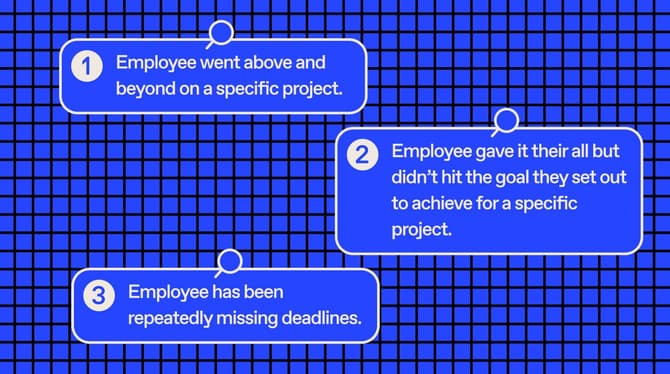The skills you need to manage are not the same skills you needed in your role as an expert contributor. Management is a job in and of itself, and to master this role (just like you did your last one), you'll need a new set of management skills in your toolbelt. Really, it's a fine balance between mastering your interpersonal skills and learning the technical skill required in your new role. You've landed in the right place to learn exactly what hard skills and soft skills you need to hone in on to lead successfully.
Exclusive online summit
·
May 23 2024
Moments that matter: how to seed great work
What's in this article
- 7 effective management skills to lead successfully
- Effective communication
- Time management and prioritization
- Relationships and team-dynamic building
- Strengths-based coaching and delegation
- Problem-solving and solution-orientedness
- Delivering and receiving constructive feedback
- Emotional Intelligence and soft skills
- 5 Takeaway tips to develop your key management skills
7 effective management skills to lead successfully
Effective communication
To be a successful team leader, first, be a successful communicator. As a manager, this means being clear and being human. The more clearly you can get your point across, the greater the chances are your team will follow your vision and be able to succeed in their own roles.
Scenarios where effective manager communication is pertinent:
- When delivering important and impactful news like a change in strategy, failure to reach objectives, or someone leaving the team. Are you giving enough visibility behind why the decision was made and how it affects them?
- When communicating your expectations of each employee. If someone delivered these same expectations to you, would you find them clear?
- When explaining team and employee goals and objectives in a way that is motivating.
Are your words motivating and encouraging when discussing goals?
Time management and prioritization
Being involved in your team's high-level time-management without micromanaging is one of the most effective management skills you can develop. Your team's capacity to be productive is essential for their overall performance. Your high-level strategic thinking should help guide how they make choices and decide on the initiatives they chose to work on.
How to help your team manage their time and prioritize projects:
- Question their ways of working, tools, and processes: Are they the most efficient and relevant to their needs?
- Help them reflect on any outside requests they take on from other teams: What's at stake when they do and how can you help them learn to say no?
- Lead the prioritization of their tasks based on the business objectives: Encourage them to reflect on their choice of project or tactic based on the goals they need to reach.
Relationships and team-dynamic building
More than anything, being a manager is about nurturing positive, trusting relationships. You'll get the best out of your team when they work well together, feel comfortable having difficult conversations, and enjoy the time they spend with their peers.
Here's how to ensure you keep relationships a top priority:
- Understand how your team feels about their trust levels with you and their colleagues using anonymous feedback tools like Officevibe. You can actually get tangible data on how employees feel working with their peers and with you.
- Before collaborating successfully, take time to learn about one another and how everyone likes to work, what motivates them, triggers them, what needs they have, etc.
- Prioritize getting to know your employees during more informal 1-on-1s in addition to your performance-based sessions. Learn about their lives and interests beyond work, and share yours too. The more you can humanize yourself as a manager, the more successful you will be able to lead.
🛠 We built a tool to facilitate this team collaboration discussion in our manager toolbox.
Strengths-based coaching and delegation
Becoming a great manager means becoming an orchestrator for your team. You're there to ensure things get done, not do them yourself. Your job is to help employees shine by understanding their development goals and letting them work on tasks that develop their strengths. But...
34% of Officevibe respondents do not agree that their organization makes proper use of their strengths.
Tip: To understand your employees' strengths, communicate with them often to learn when they feel best at work. Ask questions like “What project did you feel most proud of and why?”
Problem-solving and solution-orientedness
It's inevitable that you and your team will face challenges and difficulties. Time spent looking for who's at fault or dwelling on the issue is time that is not spent on promoting learning or finding solutions.
Management is in part about being confident in your decision-making skills, critical thinking, and problem-solving techniques, but more so about coaching your team to hone in on these same leadership skills.
Tip: Instead of giving the answer, ask questions that challenge assumptions to help employees find the root of the problem. For example, “Why did you use this method?” or “How did you come to that conclusion?
Delivering and receiving constructive feedback
Giving and accepting constructive feedback is one of the most important management skills you can build. When employees see they see that they can apply the feedback that helps them grow in their career, constructive criticism becomes widely appreciated.
Feedback tips for managers:
1. Don't wait: Give feedback in a timely manner so employees can start improving right away.
2. Be specific: Avoid generalisms when giving constructive feedback (check out our latest post on giving tough feedback while working remotely)
3. Ask for feedback too: This helps level the playing field and allows you to improve in your role as well. Officevibe lets managers collect constant feedback from employees.
Here is a list of employee feedback examples to help you deliver constructive feedback to your team.
Emotional Intelligence and soft skills
Managers of the modern workforce need to prioritize their ability to connect with people beyond numbers and goals. Developing your Emotional Intelligence will help you build trust with your employees and really understand what motivates them. Not only that, it will help you be more fair as a manager.
The process of developing your Emotional Intelligence and people skills in part means learning to manage your emotions in high-stakes situations and getting to know yourself better too. Having the ability to identify your own biases and be aware of your emotional triggers will help you become a better leader.
5 Takeaway tips to develop your key management skills
- Always be mindful of how you express yourself in writing or in person, as well as your non-verbal communication.
- Take the time to learn your employees’ strengths, then apply this to how you form a team or delegate tasks.
- Guide your team to come to their own conclusions instead of solving problems for them to make learnings more poignant.
- Give feedback in a timely manner, especially constructive feedback, so employees can start improving right away.
- Work to develop your emotional intelligence and human skills because relationships are at the base of your role.



